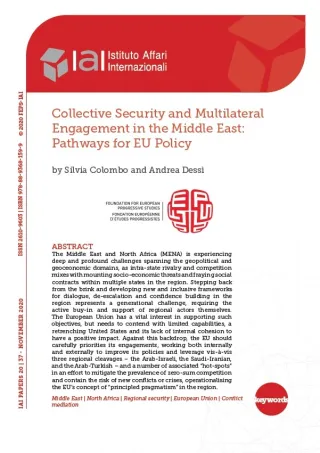Titolo completo
Collective Security and Multilateral Engagement in the Middle East: Pathways for EU Policy
The Middle East and North Africa (MENA) is experiencing deep and profound challenges spanning the geopolitical and geoceonomic domains, as intra-state rivalry and competition mixes with mounting socio-economic threats and fraying social contracts within multiple states in the region. Stepping back from the brink and developing new and inclusive frameworks for dialogue, de-escalation and confidence building in the region represents a generational challenge, requiring the active buy-in and support of regional actors themselves. The European Union has a vital interest in supporting such objectives, but needs to contend with limited capabilities, a retrenching United States and its lack of internal cohesion to have a positive impact. Against this backdrop, the EU should carefully priorities its engagements, working both internally and externally to improve its policies and leverage vis-à-vis three regional cleavages – the Arab-Israeli, the Saudi-Iranian, and the Arab-Turkish – and a number of associated “hot-spots” in an effort to mitigate the prevalence of zero-sum competition and contain the risk of new conflicts or crises, operationalising the EU’s concept of “principled pragmatism” in the region.
Paper produced in the framework of the FEPS-IAI project “Fostering a New Security Architecture in the Middle East”, November 2020.
Introduction
1. Regional challenges: Socio-economic turmoil and geopolitical ruptures
2. EU cohesion and coherence: The challenge of (re)building consensus on interests and instruments
3. Stepping back from the brink: EU pathways for dialogue, de-escalation and confidence building in the Middle East
Conclusion
References


